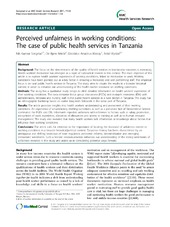| dc.contributor.author | Songstad, Nils Gunnar | en_US |
| dc.contributor.author | Rekdal, Ole Bjørn | en_US |
| dc.contributor.author | Massay, Deodatus Amadeus | en_US |
| dc.contributor.author | Blystad, Astrid | en_US |
| dc.date.accessioned | 2011-04-01T09:18:14Z | |
| dc.date.available | 2011-04-01T09:18:14Z | |
| dc.date.issued | 2011-02-12 | eng |
| dc.Published | BMC Health Services Research 11:34 | en_US |
| dc.identifier.issn | 1472-6963 | |
| dc.identifier.uri | https://hdl.handle.net/1956/4623 | |
| dc.description.abstract | Background: The focus on the determinants of the quality of health services in low-income countries is increasing. Health workers’ motivation has emerged as a topic of substantial interest in this context. The main objective of this article is to explore health workers’ experience of working conditions, linked to motivation to work. Working conditions have been pointed out as a key factor in ensuring a motivated and well performing staff. The empirical focus is on rural public health services in Tanzania. The study aims to situate the results in a broader historical context in order to enhance our understanding of the health worker discourse on working conditions. Methods: The study has a qualitative study design to elicit detailed information on health workers’ experience of their working conditions. The data comprise focus group discussions (FGDs) and in-depth interviews (IDIs) with administrators, clinicians and nursing staff in the public health services in a rural district in Tanzania. The study has an ethnographic backdrop based on earlier long-term fieldwork in the same part of Tanzania. Results: The article provides insights into health workers’ understanding and assessment of their working conditions. An experience of unsatisfactory working conditions as well as a perceived lack of fundamental fairness dominated the FGDs and IDIs. Informants reported unfairness with reference to factors such as salary, promotion, recognition of work experience, allocation of allowances and access to training as well as to human resource management. The study also revealed that many health workers lack information or knowledge about factors that influence their working conditions. Conclusions: The article calls for attention to the importance of locating the discourse of unfairness related to working conditions in a broader historical/political context. Tanzanian history has been characterised by an ambiguous and shifting landscape of state regulation, economic reforms, decentralisation and emerging democratic sentiments. Such a historic contextualisation enhances our understanding of the strong sentiments of unfairness revealed in this study and assists us in considering potential ways forward. | en_US |
| dc.language.iso | eng | eng |
| dc.publisher | BioMed Central | eng |
| dc.relation.ispartof | <a href="http://hdl.handle.net/1956/6257" target="blank">Health worker motivation in a low-income context. The case of rural health services in Tanzania</a> | eng |
| dc.rights | Attribution CC BY | eng |
| dc.rights.uri | http://creativecommons.org/licenses/by/2.0 | eng |
| dc.title | Perceived unfairness in working conditions: the case of public health services in Tanzania | en_US |
| dc.type | Peer reviewed | |
| dc.type | Journal article | |
| dc.description.version | publishedVersion | en_US |
| dc.rights.holder | Copyright 2011 Songstad et al; licensee BioMed Central Ltd. | |
| dc.rights.holder | Songstad et al. | |
| dc.identifier.doi | https://doi.org/10.1186/1472-6963-11-34 | |
| dc.identifier.cristin | 830743 | |

